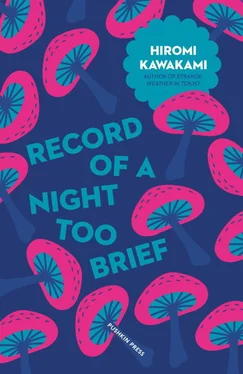This year my father and my brother no. 2 were going to act as “living pillars”, that is, humans who would lure the insects away from the crowd. The practice involves someone covering themselves all over with a lotion having a particular sweet smell that bugs find irresistible, so that they will fly straight towards the smell and thus be ensnared. So why not rub the lotion on an inanimate object? Because the insects are not lured simply by a sweet smell: it’s got to be a sweet smell smeared on a human being.
On the night of the festival, it was decided that Hiroko would be allowed to come and observe. Ordinarily it would be strictly taboo to go to the apartment block of the family of one’s husband-to-be before marriage, but since her husband-to-be was going to be one of the living pillars, she was given special dispensation.
When Hiroko came over, it was discovered that she had covered herself with a thick layer of insect-repellent ointment. “You didn’t need to go that far,” my mother admonished. “We will have the living pillars, after all. But you’re not one of us yet, are you?—so you’re not familiar with our ways.”
Hiroko blushed, embarrassed. “I’ll take care from now on,” she said, apologizing. “I’ll be one of your household soon, I’ll take care not to do anything wrong.”
My father and my brother stripped down to their underwear; the sweet smell they had smeared on their bodies permeated the air, and the bugs swarmed round them, buzzing loudly. My father and brother stood stock-still, their faces taut.
In a few seconds their faces and bodies were a crawling mass of insects. “Are they really going to survive that?” Hiroko exclaimed in horror, clearly wanting to throw aside the restraining hands of my mother and the officials of the residents’ association and rush to help the human sacrifices. It was difficult to know if my father and brother could hear her. They were covered from head to toe with insects, but they stood bolt-upright and didn’t move.
Hiroko started screaming. “Why do you have to do this stupid thing? Why don’t the rest of you let yourselves get stung?”
But no one paid her the blindest bit of notice.
“If you want to change things so radically you could always stand for election as a member of the residents’ association committee,” a committee member said to her.
“All right. As soon as I’m a member of the family, I will!” Hiroko replied, indignant but with resignation. And with that she lost consciousness.
Immediately the insects swarmed over to her, but not one would land on her because of the strong insect-repellent.
My mother and I sighed as we pressed cool towels on her forehead.
With the festival over, my father and my brother no. 2 took to their hammocks and didn’t get up for a whole month. Their entire bodies were swollen and covered with blisters: it was a month before the blisters burst and formed scabs. The scabs were on their feet, hands, bellies, eyelids, and ears—whatever patch of skin had been left exposed—and as the scabs hardened they got extremely itchy: in the last week or so, my father and my brother were scratching themselves constantly. There were scabs even inside their ears, which meant that communication during the telephone calls between my brother no. 2 and Hiroko was impossible.
“Can’t you do anything about those scabs?” Ten would plead with us on her occasional telephone calls. Hiroko was apparently missing the sweet nothings she exchanged with my brother no. 2 so much that she was growing wan and thin. Her voice did seem to my mother and me—we were now taking her calls—to be growing pitifully weaker. Despite the communication difficulties, Hiroko still made her calls every day at the same time, and attempted to discuss this and that. Hiroko would always end every call in tears.
How is someone who is so sensitive ever going to become one of us? my mother and I wondered. It’s not something you say out loud, so we didn’t express it. But we each knew this was what the other was thinking. I strongly suspected that what had made Hiroko so delicate was her family’s custom of breathing in the fragrance of parsley and mugwort. Or maybe it was those pipe fox things they kept over in her family.
On nights when Hiroko seemed particularly disconsolate we went and reported to my brother no. 2 how very sad she was, and he would react with amazement. His heavy, scab-covered eyelids would widen as he stared in surprise.
Why on earth is she letting it get to her so much, he seemed to want to say.
“I think it might be because she loves you,” I would reply. And then he would make a face that said:
“Well, I love her too. I want to marry her, don’t I? But why does she have to cry about something like this?”
“It’s not clear.”
“Do you think she’s a bit peculiar?”
“No. She comes from a different family, that’s all.”
When all the scabs fell off my brother no. 2’s body and he was able to have a normal conversation on the phone, he put a call through to Hiroko. Hearing his voice, she immediately broke down in tears. The entire family was listening.
“I love you so much!” Hiroko said, sobbing uncontrollably.
“You love me so much it makes you cry?” my brother no. 2 replied, in a bored tone of voice.
“Yes! Yes! I do!” Hiroko replied. And then, bursting into another fit of sobbing, she blew her nose loudly. I was sure that Hiroko’s relatives were all ranged around her and listening, in the same way that we were with my brother.
After thinking for a while, my brother no. 2 spoke.
“My love for you,” he declared softly, “is wider even than the floor area of the largest apartment in this apartment complex.” There was the sound of applause at the other end. At that we on this end started to clap too. The ripples of applause kept on coming, one after another. In the brief pauses between them we could hear Hiroko blowing her nose.
It was the day of the wedding at last. Dressed in bridal robes embroidered with gold thread, Hiroko made the journey over from the Hikari Housing Development. Her family accompanied her. All of them came over in a slow-moving procession, having loaded Hiroko and her furniture onto a truck decked out with banners of white and red, in accordance with instructions given them over the telephone by Ten. Hiroko’s sisters and I were the bridal attendants, and Hiroko’s grandfather read out the Shinto prayers, and in this manner the wedding ceremony proceeded without a hitch. There were the usual delicacies for a sit-down meal, and everyone ate their fill. When it was over, Hiroko’s family expressed their profuse thanks and took their leave. And then off they went, piled onto their festively decorated truck.
Hiroko sat with a distracted air surrounded by our family, still dressed in her kimono embroidered with gold thread. My brother no. 2 seemed to find the kimono amazing, and constantly pulled at its sleeves or lifted up the hem. Hiroko looked as if she wanted to brush his hands aside, but she didn’t and simply sat there looking uneasy. My mother took them to the room where their hammocks were hanging, and closed the door. This was the rite of the first marital night.
As we stacked up the lacquer platters which the sushi had been delivered in and washed up the saké cups, we listened intently, just as we had when they talked on the telephone. But no sound, not even the faintest rustle, came from the room. No vows of love, no screams, no whisperings. My mother opened the doors very slightly, and made a few gestures of encouragement, but neither my brother no. 2 nor Hiroko made any movement in response. Waiting until dead of night, the family entered the room to take to their hammocks. My brother no. 2 and Hiroko were each fast asleep, each in their own hammock, snoring. Hiroko was fully dressed in her gold-embroidered kimono.
Читать дальше

![Хироми Каваками - Strange Weather in Tokyo [= The Briefcase]](/books/29150/hiromi-kavakami-strange-weather-in-tokyo-the-br-thumb.webp)



![О Генри - Недолгий триумф Тильди [The Brief Debut of Tildy]](/books/415353/o-genri-nedolgij-triumf-tildi-the-brief-debut-of-thumb.webp)






